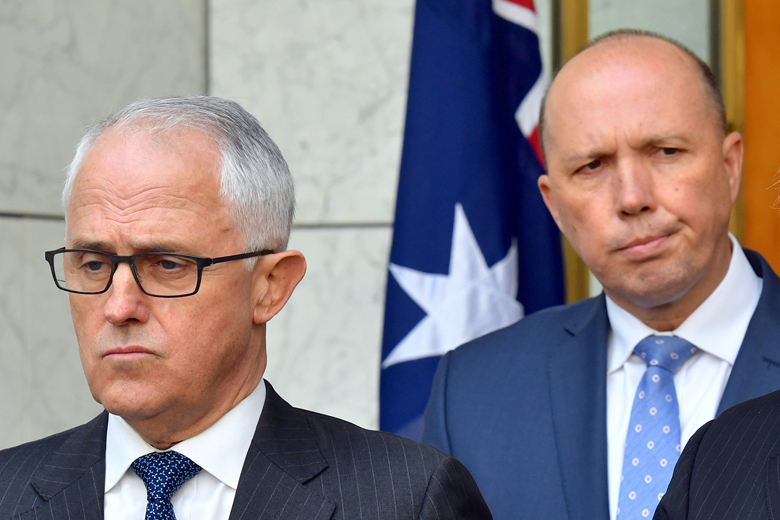Australia's new home affairs ministry caught in controversy
Sign up now: Get insights on Asia's fast-moving developments

Australia's Prime Minister Malcolm Turnbull and then Minister for Immigration Peter Dutton, now Home Affairs Minister, at a media conference at Parliament House in Canberra on July 18, 2017.
PHOTO: REUTERS
SYDNEY - Australia has brought together its spies, police, border and immigration officials under one roof, despite critics warning that the new supersized security department is unnecessary and counter-productive.
After years of considering and rejecting the move, the Federal Government went ahead and established the controversial department, formally launching it - with little fanfare - on Dec 20.
The aim is to improve coordination between domestic security agencies in tasks such as tracking fighters of the Islamic State in Iraq and Syria (ISIS) returning from the Middle East.
Home Affairs Minister Peter Dutton said the new Department of Home Affairs would focus on terrorism as well as counter-espionage, drug importation, smuggling, gangs and organised crime, cyber crime and child exploitation.
"(It will) give ourselves the best chance of trying to deal with the modern reality of counter-terrorism activities … staring down the threat of espionage, dealing with incursions across our borders," he told Channel Nine.
But critics say the department will achieve little and is designed to assuage the political ambitions of Mr Dutton, a hardliner who is publicly unpopular but favoured by the right-wing of the ruling coalition.
A statement by the new Department of Home Affairs described its creation as "part of the most significant change to Australia's national security and intelligence arrangements in decades".
It will bring together numerous agencies, including the Australian Federal Police, the Australian Security Intelligence Organisation, transport security and emergency services, the Australian Criminal Intelligence Commission and the Australian Transaction Reports and Analysis Centre. It will also include the immigration department, as well as border and customs officials.
This will give immense power to Mr Dutton, who now single-handedly oversees the broad range of agencies that make up the nation's domestic security apparatus.
Prime Minister Malcolm Turnbull has long opposed the creation of a United States-style homeland security department, which merged more than 20 federal agencies in the wake of the Sept 11 attacks in 2001.
But he has insisted that the new Australian department is different and would allow separate agencies to continue to work independently. Modelled on Britain's Home Office, the department is designed to improve coordination.
But the department goes against the grain of successive independent reviews as well as the views of most analysts.
In 2015, a review of Australia's counter-terrorism efforts concluded that creating a Home Affairs Department "would not be an optimal response to the terrorism threat to Australia". It said such a department would place an excessive emphasis on domestic - rather than international - terrorism and "would be unhelpful in the current fluid threat environment".
It also said the expanded department may require counter-terrorism officials to compete with other crimefighting agencies for attention and resources.
A separate review in 2008 also advised against creating an enlarged department.
Analysts said the new department was a bad move, adding that the old system had worked well and repeatedly thwarted terror plots. Some 14 imminent attacks have been foiled in Australia since 2014.
Discussing the proposal earlier this year, Mr Peter Jennings, a former senior defence official and now executive director of the Australian Strategic Policy Institute, asked: "What's broken?"
"I don't get the impression that coordination on counter-terrorism is a problem right now," he told Fairfax Media. "I think our system is working very well."
An intelligence and security expert, Professor John Blaxland, from the Australian National University, criticised the removal of separate ministerial oversight of the nation's domestic spies and police. He said such separation had made agencies more accountable and encouraged "a high degree of healthy contestability concerning intelligence judgements and operational options".
However, supporters of the new department, such as Professor Peter Leahy, a former Chief of Army now at the University of Canberra, said it would help the Government to "act quickly, seamlessly and decisively across agencies".
Political analysts suggested that the creation of the department was at least partly motivated by Mr Turnbull's desire to satisfy Mr Dutton. The support of Mr Dutton has helped Mr Turnbull, a progressive, to avoid efforts by the ruling coalition's right-wing members to undermine his leadership.
When he first announced the plan for the new department in July, Mr Turnbull insisted his motivation was not political.
"It is about the public's safety, not politics," he told reporters.
But this appears to be a departure from his views when he was opposition leader in 2008. Back then, he described former Prime Minister Kevin Rudd's proposal for a homeland security department as "a cheap copy of an American experiment".
"It was crafted more to capture campaign headlines than as a serious public policy reform," he told Parliament.
Jonathanmpearlman@gmail.com


